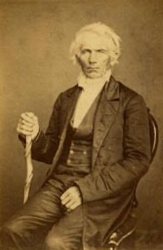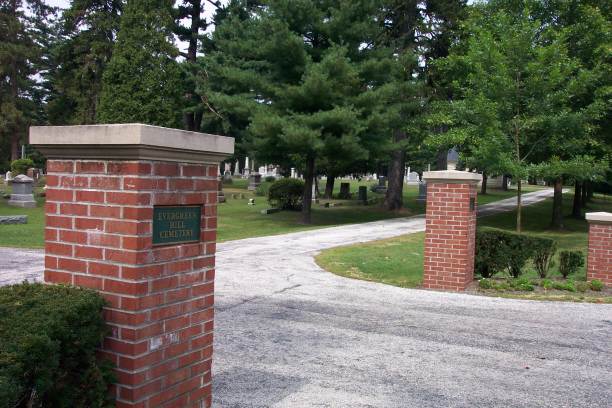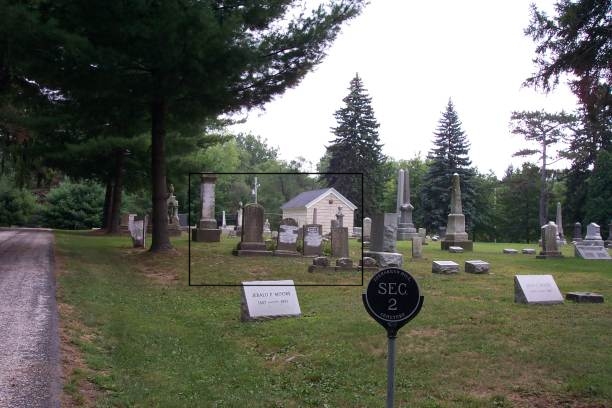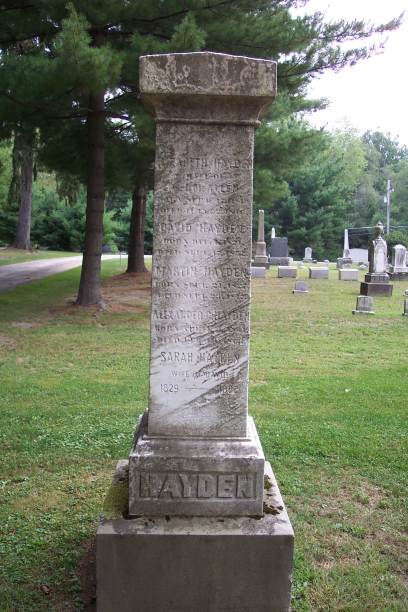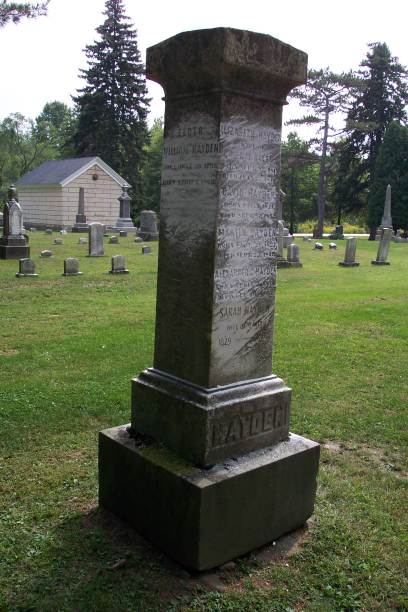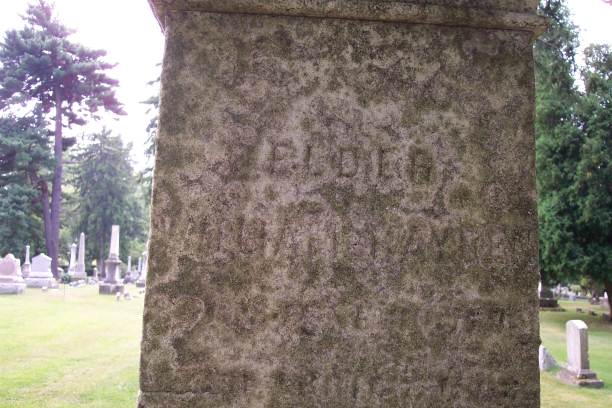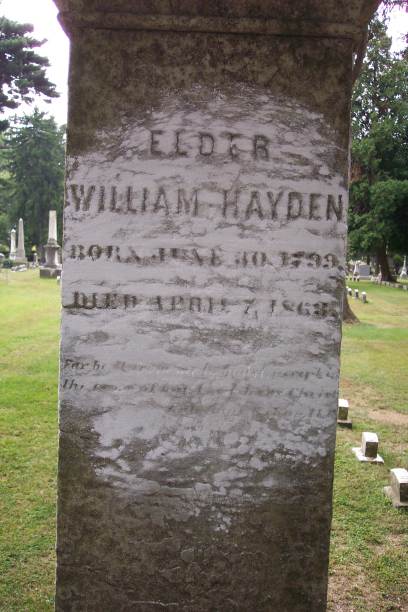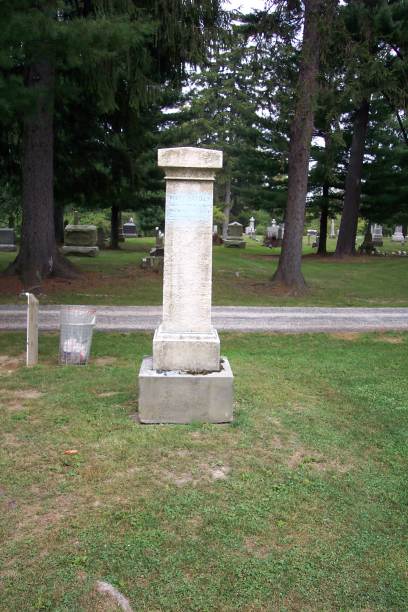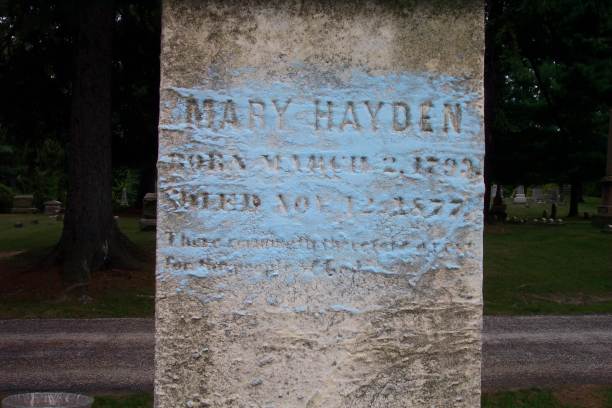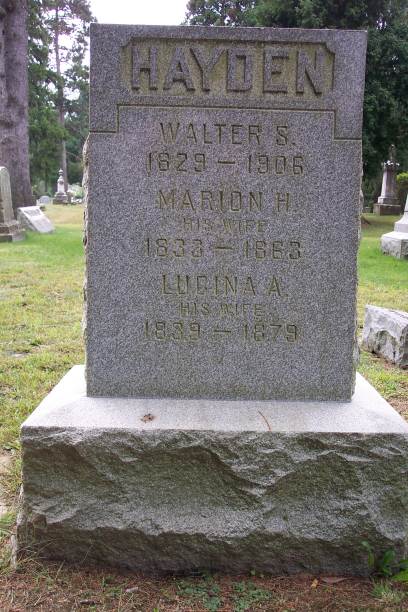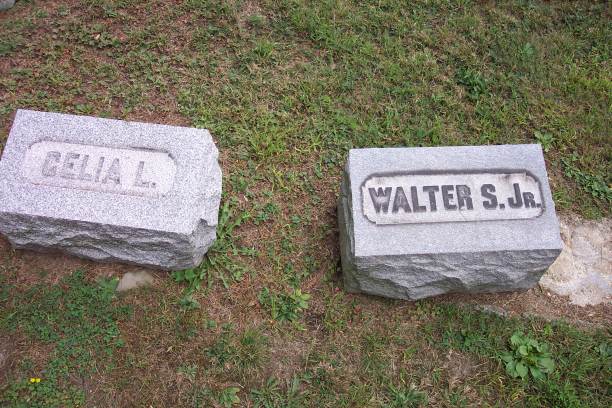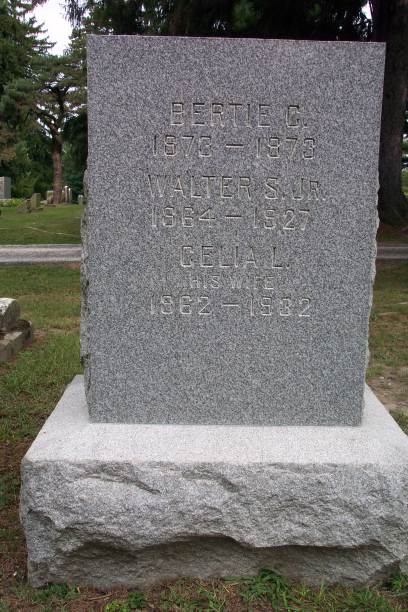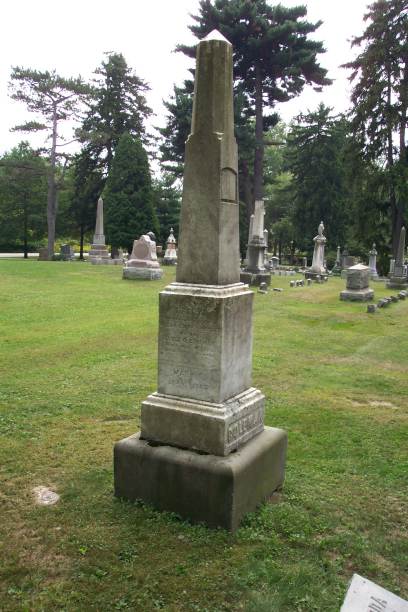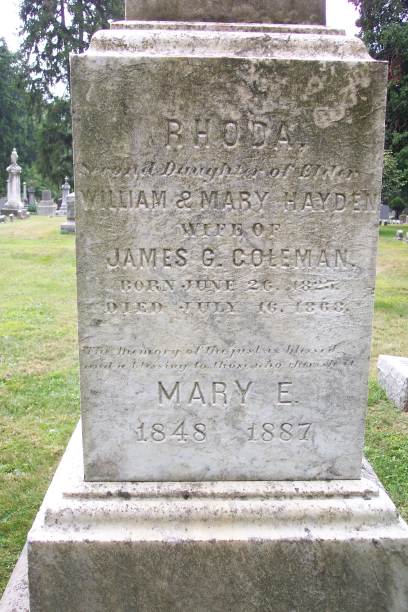William Hayden
1799-1863
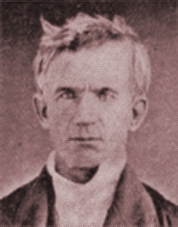
Biographical Sketch On The Life Of William Hayden
William Hayden, companion of Walter Scott in his early labors as evangelist of the Mahoning Baptist Association, was a man of rare gifts: with a good physique, strong intellect, tender emotional nature, clear voice and fluent speech, he commanded attention at once and held it closely both in sermon and song. He was a logical reasoner, and pressed the claims of the gospel upon thinking men with convincing power and a pathos that was well-nigh irresistible. He used to say: "If I wish to convert a man, I never debate with him in public, but get as near to him as I can and kindly talk with him in private and bring his mind into personal contact with the gospel story of Jesus and His divine mission. But if a man is bold and defiant, like Goliath, and is leading people astray, then I will floor him if I can." And he could and often did, for he was quick in action and always had his cause and argument well in hand. He was especially strong in the internal evidences, and in miracles and prophecy.
He went to a village on the Western Reserve to preach on a Lord's Day, and was entertained at night at the home of a good sister, whose husband was an infidel, but very hospitable. In the early evening he introduced the subject of the claims of the Bible upon the rational confidence of men, and drew from his kind host a statement of his objections to Christianity. As he presented them one at a time, Hayden, with utmost frankness and fairness, discussed them and refuted them so clearly that the objector surrendered them one after another, regardless of the fleeting hours of the night. As the morning dawn appeared in the east, he said: "Have you any further objections to urge?" "Only one more," was the reply. It was stated and completely answered, and his candid opponent surrendered. Quickly he asked: "What, then, will you do?" As promptly the response came: "I will confess Christ and follow Him." And he did, and was a faithful Christian all the rest of his long life and blessed the world with an excellent family.
On another occasion, in a community where skepticism was prevalent and boastful, Wm. Hayden preached a sermon on the miracles of Jesus—publicly performed, of great number, variety and beneficence, and wrought immediately, instantaneously and without failure in a single instance: so evidencing the divine power and prerogative of our Lord. It flashed upon him that skeptics claimed that miracles of a similar character were wrought by mesmerism and other powers. He turned suddenly toward the objectors and said: "What do men say to all of this? What do they do? They say, `Put a man to sleep and take his leg off and he doesn't know it.' Humph! Take a man's leg off! That's nothing. Put a man's leg on once. Try that." His hearers caught the point and the scoffers were put to silence by the forceful reply. William Hayden once said that his brother Sutton, with his sweet voice, sang people into heaven, but he had kept many infidels from going to hell.

Western Reserve Eclectic
Institute
He was born in Pennsylvania, and came to Ohio when four years old. In 1828 he was set apart to preach the gospel. During his ministry of thirty-five years he traveled ninety thousand miles, sixty thousand of which were on horseback, a distance of over three times round the world. He baptized 1,207, and preached over nine thousand sermons—that is, 287 sermons a year—and once he preached fifty sermons in the month of November. His industry was proverbial. He was incessant in preaching, teaching and in conversation—in public and private. He created openings, occupied them, and when others could be found to hold the position, he broke new ground. He was the first man and the chief operator in raising up the churches in Ravenna, Aurora, Shalersville, Akron, Russell and several other places. He did all this work largely at his own expense. To perpetuate and carry on the work, he promoted the founding of the Western Reserve Eclectic Institute and the Ohio Christian Missionary Society. His converts were thorough and decided like himself. It is said that he could, from memory, almost reproduce the New Testament.
—Alanson Wilcox, History Of The Disciples Of Christ In Ohio, The Standard Publishing Co., c.1918, Chapter 9, “Great Leaders” pages 67-69, 83
![]()
Death Of Elder William Hayden
Collamer, Ohio, April, 1863.BRO. CAMPBELL:—It becomes my duty, painful duty indeed, to announce the demise of another of your earliest associates in the gospel. My dear brother, WILLIAM HAYDEN, is sleeping his last sleep. He died Tuesday morning, the 7th inst., and was buried, amid universal lamentation, on Friday, the 10th. His age was 63 yrs. 9 mos.
For about two years he has suffered by a rare disease, a gradual loss of power in the motor nerves of the system, causing debility and decay of all the muscles. The organs of speech sympathized with this condition of the system to such an extent, that when he was near the close of his life he could scarce give utterance to an intelligible word. He continued to preach long after his tongue had become paralytic, and it was remarked by many that his discourse and conversation gained rather than lost the melody and ripe maturity of a soul drawing nigh the gales of the eternal world. The pain of his sickness was not acutely severe. He suffered mostly for the want of breath. It is a pleasure to know that he manifested great patience throughout the whole time; and this is the more remarkable, as he possessed a constitutional activity and energy rarely excelled. He foresaw the result of the fatal malady that was dealing with him quite as clearly as any other person; and he witnessed the gradual and threatening approaches Of the “King of terrors” with a valorous firmness which nothing but an unfaltering trust in Jesus our Savior can supply. At last, when the fatal hour came, three prayers which I have known him to utter for more than twenty years, were all granted him:—one, that he might possess his reason; and he did have it perfectly: one, that he might be favored with speech; this was given him in measure; the other, that he might pass quietly away; for most tranquilly he bid the earth adieu, and was at rest in Abraham’s bosom.
No cloud, nor even shadow, passed over his mind. Even his fine memory was as quick and powerful as in the full tide of animate health. His chief and almost exclusive thoughts related to the gospel and its prosperity in the earth. Within a few days of his death, two of his neighbors, one of them an unbeliever, came to see him on business. The business transacted, knowing the views of his neighbor, he made a few general remarks on the power and excellency of the Christian religion, with such force and pathos that his visitor left him weeping like a child. His life and labors came in review, and the affectionate remembrances of his co-laborers in this religious reformation to which he had consecrated himself, afforded him great joy, in hope of the re-union that awaits all the children of God.
Clearness of views, boldness, enterprise, a surplus of energy, and a marked force of will, constituted in him a peculiar power, through which he impressed his character firmly and ineffaceably on this living age. No censures will be passed on me, especially by those within the circle of his labors, for supplementing a few statements in regard to his character, labors and history.
He was born in Rastrover township, Westmoreland co., Pennsylvania., June 30th, 1799. About four years afterwards, his father, Samuel Hayden, moved to Youngstown, in the new and almost wilderness State of Ohio. Here William, the oldest child in a family of eight children, suffered the usual hardships and privations of life in a new forest home. He became a deist, and then an atheist, before he was twelve years of age. He was rescued from the vortex of atheism by the reflection that if nothing had eternally or rather primarily existed, nothing could have arisen, or been originated hence a cause uncaused is self-evident. From deism he was driven by reasoning that if God made us, we are not too insignificant for him to govern and judge us.—Having little else to read in those days be perused the New Testament. He was charmed by the character of Christ as it is exhibited in the gospels. Alarmed by the growing wickedness, he resolved to turn his course and reform. He attended meetings, sought opportunity to hear religious conversations, and was especially interested in hearing Christians sing the hymns that celebrate the love, compassion, mediation and intercession of the Redeemer. At length the following passage of Scripture thoroughly aroused him: “I say unto you, that for every idle word that men shall speak, they shall give account thereof in the day of judgment; for by thy words shalt thou be justified, and by thy words shalt thou be condemned.” (Matt. 12:36, 37.) “Fleeing from the wrath to come,” he found “refuge in the hope set before us in the gospel.” And ever afterward Jesus Christ was to him “all and in all”—the joy, the refuge, and the delight of his soul. He was baptized by Elder Joshua Woodworth, May 19th, 1816, in his seventeenth year, and entered the Baptist church, of which his parents were already members.
He was one of the first to embrace and to enlist for the defense of original Bible Christianity. A close reader of the “Christian Baptist” from its first issue in 1823, he was fully prepared for the work of religious reformation plead with such distinguished ability in that periodical. He was a member and delegate in the Mahoning Baptist Association which met in New Lisbon in August, 1827, when Elder Walter Scott was appointed by that body to the work of an Evangelist.
In one year the whole country in Northeastern Ohio was awakened by the fervent eloquence of that accomplished orator and preacher.—The following year, Aug., 1828, the Association met in Warren, Trumbull co. At the special request of Bro. Scott, William Hayden was chosen and appointed his fellow-laborer. Thus he was the second man called forth into the evangelical field, and he aided much to swell the tide of religious power which swept over the whole country. While the members of the Association were discussing bounds and limits for Scott’s field of labor, the gifted preacher cried out, “Give me my Bible, my head, and Bro. William Hayden, and we will go forth to convert the world to Jesus Christ.” A brother arose immediately and said, “I move that we give Bro. Scott his Bible, his head, and Bro. William Hayden”; which motion was promptly seconded and unanimously passed. He was ordained to the work of the ministry that same fall, in October, by Elders Walter Scott and Adamson Bentley.
Elder Scott remarked in the hearing of the writer of this sketch, that he chose Bro. Hayden, not only for eminent preaching ability, but also for his musical powers. “There is not a man,” he said, “in the whole Association that can sing like him.” Scott, himself possessor of admirable and delicate musical feelings, rightly appreciated the value of such a power, and correctly discerned the depth and almost unlimited compass and melody of Hayden’s voice. Few ever equaled him in power and sweetness of tone. It was soft as a flute, and often swelled in majesty like a tempest. Hundreds came to his meetings to hear him sing; and he always had a store at hand, animated and plaintive, with which he could arouse, alarm, or melt the sinner’s heart.
From the time of his selection and ordination, preaching the gospel was his chief business of life. During his ministry of near thirty-five years, he traveled nearly ninety thousand miles, full sixty thousand of which he made on horseback!—that is, by this latter mode of travel, more than twice round the world! These travels extended from Syracuse, N.Y., on the East, to the Mississippi River on the West; and from the Provinces of Canada to Virginia. Yet his labors were mostly performed on the Western Reserve and its borders in N.E. Ohio, where he planted many churches. The baptisms by his own hands were twelve hundred and seven, about seven hundred of whom were females. He preached over nine thousand sermons; which is two hundred and sixty-one discourses per annum for every year of his public life. He once preached fifty sermons in the month of November alone. Besides all these pulpit services, his private labors were abundant and incessant. The people gathered about him for the instruction and edification of his conversation. Few excelled him in this kind of power. He had a peculiar turn for winning attention and imparting instruction in the social circle, mingling the humor that charms with the experience that imparts information. Few could relate or relish an anecdote better, or apply one more appropriately for the purposes of illustration. Yet he never indulged in recitals of any in which the adorable Name, or any of the titles of the Most High, were even playfully, much less irreverently introduced;—a practice against which he bore frequent and forcible testimony.
Few persons, perhaps, have done so much as he to start forth others into the gospel field. Though occasionally severe on an ignorant, arrogant preacher, he was prompt and sagacious to discern and encourage real merit. A number of our most useful and popular preachers, whose names personal delicacy forbids me to mention, will attest his seasonable words in a critical juncture of overwhelming discouragement, by which they were aroused to another and successful effort to stand forth for the gospel. He has done much more to explore resources of power and to originate means for the execution of benevolent schemes than the world will ever know.
There is no test of real bravery of the spirit like that which is often presented in the work of preaching the gospel. To labor year in, year out, in season, out of season,” pioneering a new cause, over all roads in all seasons, few to encourage, many to censure, with meager compensation, often none at all, ah! this is courage, this is bravery, this transcends all earthly heroism! and what is the inducement,—what the “pay?” To rescue here and there a conscience-laden sinner, to help a fainting pilgrim, to deliver a needy soul from the meshes of ignorance, temptation and sin; to bless the world with the joys of salvation; to give unto them that mourn in Zion beauty for ashes, the oil of joy for mourning, the garment of praise for the spirit of heaviness.” Isa. 61: 3.
His mental powers were most rapid and energetic in action. His method of reasoning tended to generalization, embracing great variety in subject and method. Though not favored in early life with an extensive education, his taste, discernment and industry very fully supplied this lack of opportunity, and stored his mind with much general information and critical historic learning.
The master quality of his mind was his almost matchless memory, —memory of history, incident, event and chronology. In all his temporal business, of which he transacted considerable all life long, he kept no book account. He made no memorandum of his sermons; and he could report at any time, promptly and accurately, the number of his sermons, baptisms, miles of travel, and multitudes of incidents connected with all these matters,—and all without pen or pencil to aid him! It were vanity, perhaps, to assign him in this behalf a place with Macaulay, or Johnson; but all who knew him wondered at its power, a power which was all his command with undiminished force up to the hour of his death.
In his character were chiefly discernible firmness, inflexibility, affection, and qualities eminently social, and hospitable. His religion was conscience and reverence: his humanity, a tender and systematic benevolence. He gave many hundreds for humane, religious and educational purposes.
During the course of his public ministry in the gospel he had as fellow laborers Elder Thomas Campbell, Brothers Walter Scott, John Henry, Cyrus Bosworth and Marcus Bosworth, Benjamin Alton, Harvey Brockett, Calvin Smith, and William Collins, all of whom are at rest with him from their labors; besides the following brethren with many others who still remain to fill up their days in public usefulness, viz.: Adamson Bentley, M. S. Clapp, A. B. Green, J. J. Moss, Jonas Hartzel, J. H. Jones, J. P. Robison, Dr. S. E. Shepard, J. M. Bartlett, Edwin Wakefield, Isaac Errett, J. W. Lanphear, E. H. Hawley, L. Cooley, and W. A. Belding.—A. S. H.
—Report by A.S. Hayden, Millennial Harbinger, May, 1863, Pages 232-236![]()
Biography of William Hayden
William Hayden was born in Rosstrevor Township, Westmoreland County, Pa., Lord's day, June 30, 1799. In April, 1804, his father moved to the wilds of the new State of Ohio, and settled in Youngstown, where William, the oldest of the family, experienced the privations of pioneer life. Fond of reading, and having access to few books, he read much in the Bible. He was, when he was young, perplexed with questions about the origin of things, and what shall be hereafter. He was a deist before he was twelve; then for awhile the gulph of atheism yawned before him. From its frightful chasm he was rescued by the reflection, that "if nothing had eternally or primarily existed nothing could have been originatedy and that hence a cause uncaused was self-evident," He farther reflected that to doubt the existence of a Creator leads necessarily to a doubt of the existence of the creature. For awhile he tried the bold adventure of doubting his own existence. This was impossible. His conclusion, in his own words was, "there is no sense in being a fool!" Cured now of atheism—for deism he found another remedy: "I plainly saw that to turn away from the Bible, we plunge ourselves into darkness, and our only refuge is in our ignorance." "Finally, reading again the narrative of the inhuman treatment of Christ from the garden to the sepulcher, and seeing how patiently and meekly he endured it all, his whole life passed in review before my mind. I was indignant that such a person should be so treated. What harm had he ever done them? The only perfect character that ever appeared on earth; a model of goodness, wisdom, dignity, condescension, and pity—just such a friend as ignorant, suffering man needed—and to be requited thus! Till now I had never seen sin in its hatefulness, and I felt myself a sinner."
For four years longer, till he was sixteen, he struggled in the mysteries of Calvinism; hoping, if he was one of the elect, God would impart the evidence of it in a needed and desired regeneration. A revival occurring, he sought the coveted relief. At last, he was thoroughly aroused by the words of Jesus, Matt, xii: 36, 37: "I say unto you, that every idle word that men shall speak, they shall give account thereof in the day of judgment. For by thy words thoushalt be justified, and by thy words thou shalt be condemned." He fled for refuge to the hope of the gospel. He was baptized May 19, 1816, by Elder Joshua Woodworth, and united with the Baptist church, of which his parents were members.
December 20, 1818, he married Miss Mary McCollum, and settled on new lands in Austintown. In the midst of his work his zeal did not relax. When the church in Youngstown ran down, he took membership in Canfield. He studied the Scriptures diligently, and was ready always to give a "reason for the hope that was in him." I quote from his own pen: "I had heard some time before of one Alexander Campbell. I had read a sermon from his pen, and now in October, 1821, he was to preach in Warren, and I resolved to hear him. He was then thirty-three years of age, the sharpest man I ever saw, both in appearance and in intellect, and I confess I was afraid he might lead us astray. His first sermon was from the text, 'Thy kingdom come.' I soon saw what he meant to make out, and I did not mean to believe him; but I could not help believing him. He showed that the kingdom had come. At that meeting, which was for the mutual improvement of the preachers, he made several remarks, which were new and startling, and of infinite use to me. He said 'the true disciple of Christ will follow the truth wherever it leads.' Upon a moment's reflection, I saw there was no safety in doing otherwise. I resolved that whatever the truth would make me, I would endeavor to be. A second was, 'you will notice the apostles in preaching the gospel never said one word about election.' I saw this was true. But then I thought, what is the gospel? I soon saw if the gospel can be preached without election, so can it without any of the 'five points.'"
A person with so tenacious and energetic a mind could not abandon the cherished system of Calvinism without a great struggle. His "Christian experience" had to be analyzed, and every impression and feeling traced to its cause. But the truth that faith comes by hearing the testimony of God was revolutionary, and he did not rest till it had gained in his mind the complete ascendency. Every number of the Christian Baptist was thoroughly sifted. No wonder, then, that after seven years of so thorough a schooling he was ready, at the call of the association, to enter unhesitatingly into the work of teaching the true gospel to the world. His own struggles, and his complete mastery of his own difficulties, prepared him to relieve others from similar doubts and scruples.
In May, 1828, the church of Canfield gave him license as a preacher of the gospel. In October following, after his call to ride with Scott, he was ordained, in his own church of Austintown, of which he was then a member and leader, by brethren Scott and Bentley.
From this time his labors were double those of most men. Working with his own hands as much as othermen, and yet more in his saddle than most preachers. For twenty-five years he was absent from his own home on an average two hundred and forty days and nights each year. His industry was proverbial. He was incessant in preaching, teaching, and conversation—in public and in private. He created openings—occupied them, and when others could be found to hold the positions, he broke new ground. He was the first man and the chief operator in raising up the churches in Ravenna, Aurora, Shalersville, Akron, Royalton, Warrensville, Solon, and Russell, and several others.
The following from his pen, written near the close of his life, is worthy of careful attention:
*'I perceived within six months of the beginning of my labors the necessity of system in our operations, of which we had none—measures to call out and prepare fit men to preach and teach, and to take care of the converts—measures to insure a reasonable support for such men—measures to secure harmony of action among the preachers, and for holding the ground already gained. I spoke of all these interests to all the brethren; but there was only one man who seemed to perceive any sense in what I had to say, and that was Jacob Osborne, one of the most wise, prudent, and godly men we ever had among us; and he died in May, 1829. For twenty years I urged these things, but they received no encouragement. I was astonished that all could not see the indispensable necessity of a matter so in accordance with common sense, and the demands of every-day experience ; for the want of which so many of our churches are languishing almost to dissolution.
"After twenty years hardship, toiling against wind and tide, my brother A. S. Hayden and I resolved that we would lay before the brotherhood the expediency of founding an institution of learning—the Eclectic Institute—at Hiram. It took with the people, and has accomplished much in many ways.
"Isaac Errett responded to the appeal uncompromisingly to aid in getting an association of churches for the purpose of missionary operations on the Western Reserve. Shortly after, in 1852, the Ohio State Missionary Society was organized. It works well, and is likely to live and prosper; for the brethren are forced to see, after so long a time, the need of united action. But, oh how much the cause of Christ has lost ! and how many have died ignorant of the gospel ! and how many more will, for not having had a good system of management from the commencement!
"But now my labors are about ended, and I am beginning to see the brethren act like men of common sense. One whole generation has passed away, and we are not quite ready to begin to act with efficiency in this great work of showing our contemporaries the true gospel in contradistinction from the speculations of men about the gospel. Until the true gospel is honored by its friends, it will not be heard so as to be understood ; and, until it is understood, faith that justifies will be supposed to come by prayer and the mysterious work of the Spirit ; and while that is so, the evidence of prophecy and miracle will not be taught the people. Consequently, ignorance, unbelief, division, and iniquity will abound, as it is at this day.
''No man has labored so wisely and so successfully as Alexander Campbell, to show the true gospel and its evidences, and how men become Christians, since the great apostasy commenced; and almost no man appreciates his labors! He has left nothing to be done by any other reformer who may come after him; and I fear it will be another generation before those who acknowledge him a reformer will organize, so as to be as efficient as all other people are in conducting their affairs."
His teaching on the whole question of conversion, was so clear and thorough, few who heard him candidly failed to see the difference between the teaching of the Scriptures on this important subject, and the mystic theories of regeneration which bewilder the mind and perplex the conscience. His converts were, therefore, thorough and decided, like himself. One of these, Jewett Frost, of Richfield, could not rest till his brother and other friends in Riga, New York, should hear the same truth. At his instance, Wm. Hayden went into that State in 1832, and afterward, alone or in company with others, he made many and extensive trips in most of the Western counties of the Empire State, and in Canada, where he powerfully proclaimed the gospel, and rendered the most efficient service in establishing the cause of reformation. In western Pennsylvania, Virginia, and in all the region of Northeast Ohio his pioneer labors laid the foundations for others to build upon. Some of his most stirring and profitable tours were into Michigan and Wisconsin; so that from Syracuse to the Mississippi River, and from Canada to Virginia, he "fully preached the gospel of Christ."
The following account of him is from the Millennial Harbinger, to which it was sent by the writer, 1863, just after his death:
During his ministry of thirty-five years he travded ninety thousand miles, full sixty thousand of which he made on horseback—that is, by this mode of travel—a distance of more than twice around the world! The baptisms by his own hands were twelve hundred and seven. He preached over nine thousand sermons, that is, over two hundred and sixty one discourses per annum for every year of the thirty-five years of his public life. He once preached over fifty sermons in the month of November alone. Besides all these pulpit services, his private labors were abundant and incessant. He had a peculiar turn for winning attention, and imparting instruction in the social circle, mingling the humor that charms with the experience which teaches. Few could relish or relate an anecdote better, or apply one more appropriately for purposes of illustration. Yet he never indulged in recitals of any in which the adorable Name, or any of the titles of the Most High, were even playfully, much less irreverently, introduced ; a practice against which he bore frequent and forcible testimony.
His mental powers were most rapid and energetic in action. His method of reasoning tended to generalization, embracing a great variety of subject and method. Though not educated, in a scholastic sense, his taste, discernment, and industry very fully supplied this deficiency, and stored his mind with much general information and critical historical learning. The master quality of his mind was his almost matchless memory—memory, both of history and chronology. He made no memoranda of his sermons, yet he could report at any time, promptly and accurately, the number of his discourses, baptisms, and multitudes of incidents, and all without pen or pencil to aid him. It were vanity, perhaps, to assign him a place in this respect with Macaulay or Johnson; but all who knew him wondered at his power—a power which was at his command, with undiminished force, up to the hour of his death. In his character were chiefly discernible firmness, decision, boldness in enterprise, and sturdy honesty. He was eminently social and hospitable, compassionate and kind-hearted. His religion was conscience and reverence; his humanity, a tender and systematic benevolence. He gave freely for humane, religious, and educational objects.
More than a year previous to his death, he was afflicted with a gradual weakening of the muscles, which pervaded the whole system, aflecting his speech in common with every other muscular action. Without pain, and with the full exercise of his mental powers, he died at his home at Chagrin Falls, easily and tranquilly, in full nope of immortality, April 7, 1863, in the sixty-fourth year of his age.
A.S. Hayden, Early History of the Disciples In The Western Reserve, pages 176-183.
![]()
William Hayden
Biography has always been one of the most interesting forms of history to the writer, and he is assuming that the same is true of his readers. These sketches of pioneer preachers and evangelists, therefore, are being presented because of the human interest they have within themselves, and also with the hope that they may quicken the interest of others in the preaching of the gospel and the spread of the kingdom of God. There is scarcely any end to the number of such life stories that might be related, but only a few of the more interesting ones will be presented.
The subject of this sketch, 'William Hayden, was born in Westmoreland County, Pa., on Sunday, June 30, 1799. Five years later the family moved to the wilds of the new state of Ohio and settled in Youngstown. Little is said about his education, but the presumption is that he was self-educated rather than a product of the schools. In personal appearance he is said to have been "about the middle stature, thickset, and athletic, with a complexion naturally rather dark and much tanned by exposure; intelligent, light-gray eyes; light hair; a mouth somewhat large; his countenance expressive of both firmness and a kindly feeling, and often wreathed with a winning smile."
RELIGIOUS EXPERIENCES
Religious questions engaged his attention from early childhood. Before he was twelve years of age he had been both a deist and an atheist, and had involved himself in great mental perplexities. Being finally relieved of his difficulties and his faith in God restored, he was led to accept the Bible as divine from the consideration that "as God had created us, we were not too insignificant for him to govern and judge us." He was delighted with the character of Christ as portrayed in the New Testament, and was made to realize his own need of salvation. He attended religious meetings for a long time, and sought conversion according to the prevailing religious systems. Finally he was induced to accept Christ, and was baptized into the Baptist Church by Elder Joshua Woodworth, May 19, 1816.
Soon afterward he became a reader of the Christian Baptist, and was delighted with its freedom of thought and the spirit of investigation which it inspired. Nevertheless, he still was satisfied with the popular sectarian views of conversion; and when he heard Walter Scott in the fall of 1827 in his direct manner of calling sinners to immediate obedience to the gospel, he thought it was rash and dangerous. But later on, learning that Mr. Scott was to preach in a schoolhouse near the home of Simon Sacket, he rode eight miles to hear him. The house was packed with people. He was astounded at the first words from Mr. Scott that greeted his ears: "There is not a man in this house who believes that God means what he says." He was on the point of arising to dispute this statement, when the confident manner of the speaker caused him to pause and wait. Mr. Scott went on to show that men came to the Bible with their heads full of the religious systems they had already accepted, and that the Scriptures were always interpreted so as to be in harmony with these systems. The system gave the law of interpretation. Everything must be made to harmonize with it. They could not accept the obvious meaning of God's word lest it should conflict with their religious theories. He went on to exalt the importance of the Bible and to vindicate its authority. He showed its truthfulness, trustworthiness, all-sufficiency, and that it must be accepted instead of any or all religious systems. He showed that it contained in simple language the terms of salvation, and that they were intended for immediate acceptance; that the prevailing religious systems blinded the eyes, stopped the ears, and closed the hearts of the people against the plain teaching of God's word.
As he reasoned about these things, William Hayden began to feel that he was right and that he himself had been blinded and had not really believed that "God meant what he said." A complete revolution took place in his own mind as he meditated on the great truths to which he had listened. The Bible became a new book to him. He now saw the gospel to be a simple development of God's love for man, that it was perfectly adapted to every Creature, and that it contained the terms and assurance of salvation to everyone who accepted it. To preach the word and call upon sinners to obey it was both sensible and consistent, in harmony with both reason and revelation. He accepted this position at once, and was ordained as a preacher of the gospel by Walter Scott and Adamson Bently.
ASSOCIATED WITH SCOTT
At the meeting of the Mahoning Association at Warren, Ohio, in 1828, Walter Scott gave a report of his first year's work as an evangelist on the Western Reserve. There was great interest in both his work and his report. He had accomplished wonders. There had been a thousand conversions. When the question of his reappointment came up, he asked for William Hayden, for whom he had formed a warm attachment, as a fellow laborer. A discussion about restricting his labors within the limits of the association having arisen, decision on his request was delayed. Finally he arose and, with great earnestness, said: "Give me my Bible, my head, and William Hayden, and we will go forth to convert the world." Sidney Rigdon then moved that "the association give to Walter Scott his Bible, his head, and William Hayden," which was at once agreed to.
This arrangement proved to be wonderfully effective. These two evangelists, cooperating wholeheartedly, seemed to sweep everything before them. William Hayden was a great singer. He was said to be "full of song and full of songs suited to every condition." People would come out to Scott's meetings to hear him sing, and consequently would hear the gospel and be converted. "Crowded audiences were everywhere in attendance in meetinghouses, private dwellings, barns, and shady groves. Sectarian conversions almost ceased throughout that region. Preachers who opposed the "ancient gospel" lost their influence and their members, while numbers of gifted men were raised up from the ranks to become effective preachers of the word.
"IN LABORS MORE ABUNDANT"
From the beginning of his ministry his labors were said to be "double those of most men, working with his hands as much as other men, and yet more in the saddle than most preachers." For twenty-five years he spent away from home two hundred forty days and nights out of three hundred sixty-five. He was constantly teaching and preaching both publicly and privately, "creating openings and occupying them, and, when others could be found to occupy them, going forth to break new ground." He and his brother, A. S. Hayden, projected the Eclectic Institute, which subsequently became Hiram College. Beginning in 1832, he visited New York and made many tours in that state and in Pennsylvania, Virginia, Michigan, Wisconsin, and Canada. During his ministry of thirty-five years he traveled 90,000 miles, 60,000 of them on horseback, and preached 9,000 sermons—an average of 260 a year.
He died at Chagrin Falls, Ohio, April 7, 1863. -L.L. Brigance, Gospel Advocate, July 30, 1942, pages 729, 741![]()
CHAPTER XV. BENTLEY, HENRY, RAINES, HAYDEN.
A group of strong men were gathered about Walter Scott on the Western Reserve, Ohio, to whom we owe much. Adamson Bentley was one of these pioneers. He was born July 4, 1785, in Allegheny county, Pa. His father moved while he was yet young to Trumbull county, Ohio. He confessed Christ and was baptized and at the age of nineteen began to preach. With great fidelity he taught Calvinism as the Gospel. He carried this system in his head and the love of God in his heart. At a great yearly meeting in 1837 he said: t( I used to take my little children on my knee, and look upon them as they played in harmless innocence about me, and wonder which of them was to be finally and forever lost ! It cannot be that God has been so good to me as to elect all my children! No, No! I am myself a miracle of mercy, and it cannot be that God has been kinder to me than to all other parents. Some of these then must be of the non-elect and will be finally banished from God and all good. And now if I only knew which of my children were to dwell in everlasting burnings, oh! how kind and tender would I be to them, knowing that all the comfort they would ever experience would be here in this world! But now I see the Gospel admits all to salvation I Now I can have hope of everyone for eternal happiness! Now I can pray and labor for them in hope!
In 1810, he settled in Warren, and was ordained and took charge of the church. He was an excellent preacher and a man of great social influence. He was present at the formation of the Mahoning Association, and his ability as a preacher, and tact and dignity as a presiding officer, rendered him one of its prominent members during its entire existence. Tall, manly, graceful, dignified, eloquent and honest, he had great power with the people. He traveled extensively in Kentucky and Pennsylvania, crossed the mountains many times in his saddle, and was constant in labors. When the great principles advocated by Campbell began to make a stir he was one of the first to accept them and boldly seconded Scott when he came to Warren, and the whole church adopted the plan of Union contained in the New Testament. In 1831, he moved to Chagrin Falls. He preached until 80 years of age, and no man in Northeastern Ohio possessed the influence wielded by this princely man.
John Henry was another of this group, perhaps the most brilliant and gifted. His ministry lasted only about thirteen years. He was a native of Allegheny County, Pa. It was said of him that he sung tunes when not a year old though he did not talk until four years of age. He was a skillful musician, playing nine different instruments, and composing music with ease. His religious training had been in the Presbyterian faith. The Christian Baptist changed him, he was immersed by Bentley, and in. his 31st year gave himself to preaching the Gospel. He was a plain farmer, and among the common people he had great influence. He was full of the divine Word and was called often the " Walking Bible" or the " Bible with a Tongue.'' Often without any of the studied arts of the orator he moved great assemblies with a mastery that chained attention for two hours at the time. He was tall, six feet and two inches, spare, of sandy complexion and sharp features, quick in his movements and in the operations of his mind, social, kind-hearted, and of a keen and ready wit. Henry's work was felt throughout the Western Reserve. At an early time preaching with A. Campbell near Minerva, many people who had never seen either of the speakers, heard him in the morning and thought it Campbell. After an interval Campbell preached, and many of his hearers said: "We wish that man would sit down and let Campbell get up for he knows how to preach." He was a man of One Book. Mr. Campbell said of him: "As a preacher, of a particular order of preachers he had no equal—no superior. He was not only mighty in the Scriptures as a preacher and teacher, but was also eminently exemplary in the social virtues of Christianity.” He died May 1, 1844, universally mourned.
Aylette Raines was born near Fredericksburg, Va., in 1797. He was christened in the Episcopal Church at four years much against his wishes. His parents emigrated to Ohio when he was fourteen years of age. He became skeptical from reading Paine's "Age of Reason," but his mother's pious teachings held him He went to Indiana and engaged in teaching. There he fell in with the Restorationists and adopted their views. "I got religion," he says. "I underwent a great moral change. There was much of the love of God in it. Shrouded as I was in error, yet there were apertures through which the love of God passed through into my heart and made me inexpressibly happy. I now commenced the study of the Scriptures in good earnest and after two years began preaching."
He came in contact with Scott and others preaching the ancient Gospel. Hundreds were being baptized. He concluded to hear Scott for himself. One object he had in view was to bring Scott into debate. In the first sermon he heard, Scott stated what he called "the six points of the Gospel." Greatly amazed and confounded he feared to oppose him lest he should expose himself. The discourse seemed invulnerable. He said, "I can do nothing against the Gospel preached by Scott unless I should live to disgrace it which the Lord forbid."
The next day Raines heard Scott again. His subject was the resurrection. Again he was amazed. Then he heard him on the two covenants and then on the eleventh of Hebrews. Here he surrendered. Scott convinced him that he should lay aside his philosophy and preach the Gospel as the apostles proclaimed it and he began at once to bear his testimony for the truth. When his case came before the Association at Warren in 1828 it was claimed by some that Raines still held his Restorationist opinions, and should not be admitted. Campbell preached on Rom. 14, defining the difference between faith and opinion. It was agreed that if Raines expressed his willingness to preach the Gospel as the apostles preached it, and to retain his opinions as private property, in harmony with the principles of the Reformation there would be no objection. It gave an example of freedom of thought unknown under the creeds and a striking illustration of the liberality of the basis of Christian union advocated by the Reformers.
After the union of the followers of Stone and Campbell, Aylette Raines went to Kentucky and assumed charge of the united churches at Paris where he remained for twenty years and "by his steady unremitting labors and able advocacy of the Reformation principles greatly extended their influence," says Dr. Richardson.
William Hayden is another of this historic group. Born in Westmoreland county, Pa., on the Lord's Day, June 30, 1799, his family removed to the wilds of the new state of Ohio, in 1804, and settled in Youngstown. He struggled with doubt and Calvinism until sixteen and finally fled for refuge to the hope of the Gospel and was baptized May, 1816, uniting with the Baptist Church. In October, 1821, he heard A. Campbell in Warren. "He was then thirty-three years of age," says Hayden, "the sharpest man I ever saw both in appearance and in intellect. His first sermon was from the text 'Thy Kingdom Come.' I soon saw what he meant to make out and I did not intend to believe him, but I could not help believing him." In 1828 he heard Walter Scott, and his direct method of calling sinners to obedience seemed to him rash and dangerous. Hearing Scott again, his first words were, "There is not a man in this house who believes that God means what he says." Then he went on to show that men came to the Bible with their heads full of religious systems and theories and dared not take the Scriptures in any sense inconsistent with these theories less their religious systems be endangered. He vindicated the authority of God's Word as against every system and exalted its sufficiency, truthfulness, and trustworthiness, showing the propriety of relying upon the divine declarations alone, in which the terms of salvation were presented to us for our immediate acceptance.
A complete revolution was wrought in the mind of Hayden. The Bible became to him a new book. The Gospel was a simple development of God's love, and the power of God unto salvation to everyone that believed it, and it was no longer a mockery to preach, pretending to offer salvation to all, yet announcing that this was nevertheless reserved for a definite, pre-ordained number known only to God.
Hayden accepted this position and was ordained by Scott and Bentley. His labors from that time were double those of most men, working with his hands as much as other men and yet more in the saddle than most preachers. For twenty-five years he was absent from home 240 days and nights out of 365. He was incessant in preaching, teaching and conversation, public and private; creating openings and occupying them, and when others could be found to occupy them, going forth to break new ground. He, with his brother, A. S. Hayden, projected the Eclectic Institute, now Hiram College, and he had much to do with the origin of the Ohio State Missionary Society. In 1832 he visited New York, and made many tours in New York, Pennsylvania, Virginia, Michigan, Wisconsin, and even Canada. During his ministry of thirty-five years he traveled 90,000 miles, 60,000 on horseback, a distance of twice that of the earth's circumference; preached 9,000 sermons, or 260 a year; and baptized 1,250 persons with his own hands.
He had the gift of song. People would come out to Scott's meetings to hear William Hayden sing. He was full of song and full of songs suited to every condition. Scott said, "Give me my Bible, my head, and William Hayden, and we will go out and convert the world!" He died at Chagrin Falls, April 7, 1863.
-Frederick D. Power, Sketches Of Our Pioneers, c.1898, by J.Z. Tyler, Fleming H. Revell Company, Chapter 15, pages 103-112
![]()
Directions To The Grave Of William Hayden
William and Mary Hayden are buried in Chagrin Falls, just southeast of Cleveland, Ohio. Head southeast out of Cleveland on Hwy 422. After crossing I-271 take the exit at Hwy. 91 and turn right (south). Take a left on Solon Rd, heading back north. Go through Bentleyville and head into Chagrin Falls. As you come into town Solon Rd. will take a sharp turn to the right and become Maple St. You will be in the downtown area. Turn right(south) on S. Franklin St. and the Evergreen Hill Cemetery will be on your right. Many of the Haydens are buried in this cemetery. According to the records Elder William Hayden is buried in Lot 1 Section 2, very near the street. Enter the cemetery as pictured below and turn right. Go one block and turn left. Begin looking to your left for Section 2. In the same cemetery, very near Hayden's grave is very near the grave of Adamson Bentley.
GPS Coordinates
41°25'11.5"N 81°23'33.1"W
or D.d. 41.419859, 81.392523
Below Plots Looking back toward Cemetery Entrance
Elder William Hayden
Born June 30,1799
Died April 7, 1863
Elder
William Hayden
Born June 30, 1799
Died April 7, 1863
Far be it from me by God's precepts in
the cross of our Lord Jesus Christ
by which the world is crucified to me,
and I to the world. Galatians 6:14 (Living Oracles)
Mary Hayden
Born March 2, 1799
Died Nov. 12, 1877
There remaineth therefore a rest
for the people of God. Heb. 4:9
Hayden
Walter S. - 1829-1906
Marion H. His wife - 1833-1863
Lucina A. His wife - 1839-1879
Walter S. Jr & Celia L. Hayden
Bertie C. Hayden - 1873-1873
Walter S. Hayden, Jr. 1864-1927
Celia L Hayden - 1862-1932
Rhoda
Second daughter of Elder
William & Mary Hayden
Wife of
James G. Coleman
Born Jun 26, 1825
DIed July 16, 1866
The Memory of the Just Is Blessed
????
Mary E.
1848-1887
![]()
